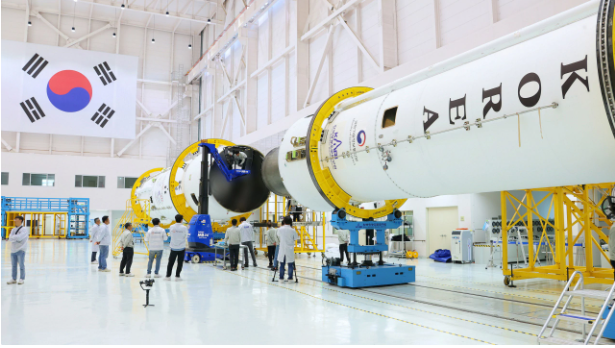Home >Technology peripherals >It Industry >The World rocket's third launch time is set: it will carry multiple private enterprise research and development satellites into space
The World rocket's third launch time is set: it will carry multiple private enterprise research and development satellites into space
- WBOYWBOYWBOYWBOYWBOYWBOYWBOYWBOYWBOYWBOYWBOYWBOYWBforward
- 2023-05-30 23:29:08830browse
According to news on May 25, South Korea's self-developed carrier rocket "World" was originally scheduled to launch yesterday afternoon. However, due to a command transmission problem between the launch control computer and the programmable logic controller (PLC) of the launch pad, The launch plan was suspended.
According to Yonhap News Agency, after a launch management committee meeting held by the Ministry of Science, Technology, Information and Communications of South Korea and the Korea Aerospace Research Institute, the time for the third launch of "World" was determined, scheduled for May 25. Taking place at 6:24 p.m.
According to the editor’s understanding, unlike previous test launches carrying simulated satellites, this launch will carry 8 satellites for scientific research developed by private companies into orbit, including the next generation satellite developed by the Korea Institute of Science and Technology. Small satellite NEXTSat 2. Other satellites carried include the Earth observation technology demonstration cubesat JLC-101-v1-2, the cosmic radiation monitoring cubesat Lumir-T1, the earth observation and weather monitoring cubesat KSAT3U, and the constellation SNIPE consisting of four 6U cubesats , this constellation can be used to monitor changes in small-scale plasma structures in the ionosphere and magnetosphere.
According to Lee Sang-yul, head of the Korea Aerospace Research Institute, this launch is of great significance because it is the first time that an actual satellite has been successfully sent into space. Previously, South Korea's Space Launch Vehicle No. 2 (KSLV-II) failed to put a virtual satellite into orbit in its first launch in 2021, but successfully put a virtual satellite and a performance satellite into orbit in its second test launch in 2022. The verification satellite was sent into low Earth orbit, making South Korea the seventh country to use a domestically developed space rocket to launch a satellite weighing more than 1 ton.

It is expected that KSLV-3, South Korea’s next-generation launch vehicle, will be launched for the first time in 2030. It is reported that KSLV-3 will have the capability to transport up to 10 tons of payload to low Earth orbit, as well as 7 tons to sun-synchronous orbit, 3.7 tons to geostationary transfer orbit and 1.8 tons to lunar transfer orbit. South Korea plans to use KSLV-3 to launch a self-developed robotic lunar lander before 2032. This will be a major leap forward for South Korea's aerospace industry.
The delayed launch was due to a command transmission problem between the launch control computer and the programmable logic controller on the launch pad. The Ministry of Science, Technology, Information and Communications of South Korea and the Korea Aerospace Research Institute have held a meeting to inspect and repair the launch automatic control system and launch pad equipment control system. They determined the new launch time after evaluation and hoped that the launch would go smoothly.
The special thing about the launch of "World" is that it will carry multiple satellites developed by private enterprises into space. This is an important milestone in South Korea's aerospace field. Lee Sang-ryu, head of the Korea Aerospace Research Institute, said that previous launches mainly focused on developing South Korea's own launch vehicles, and this launch means that South Korea will cooperate with its own customers and use domestic launch vehicles to launch Korean customers' satellites. This moment is of great significance to South Korea's aerospace industry and will also promote its development in the international aerospace field.
South Korea is developing the next-generation launch vehicle KSLV-3 and plans to demonstrate the results of its debut in 2030. This rocket will have a larger payload capacity and can carry up to 10 tons of payload into low Earth orbit, as well as carry satellites of different weights into different orbits. South Korea plans to launch a self-developed robotic lunar lander through KSLV-3 before 2032, which will be an important milestone for South Korea's aerospace industry to reach new heights.
It is hoped that with the success of the third launch of "World", the Korean aerospace industry can continue to strengthen its strength in the fields of space exploration and satellite technology, and make greater contributions to scientific research and national development. .
The above is the detailed content of The World rocket's third launch time is set: it will carry multiple private enterprise research and development satellites into space. For more information, please follow other related articles on the PHP Chinese website!
Related articles
See more- Meng Wanzhou talks about taking office as rotating chairman: Huawei is a collective leadership, not an individual succession
- Hydrogen production and separator development trends under the global hydrogen energy arms race
- Counterpoint Research: 2022 is a milestone year for the global eSIM ecosystem, with more than 260 operators supporting eSIM
- Google sued by publishers in UK for £3.4 billion
- Making mobile phones like making cars: Meizu has changed! Finally taking off?

